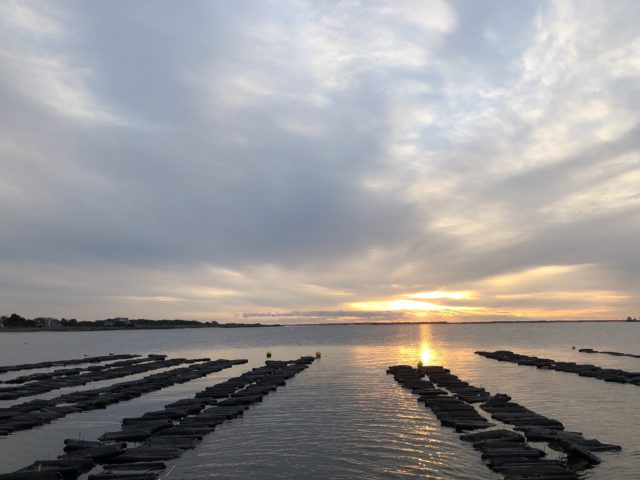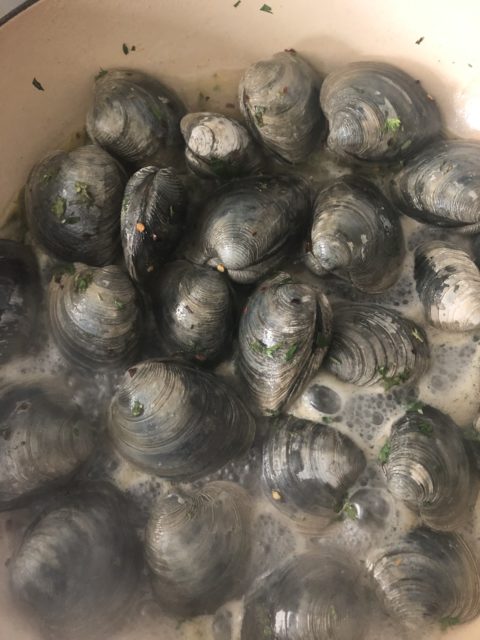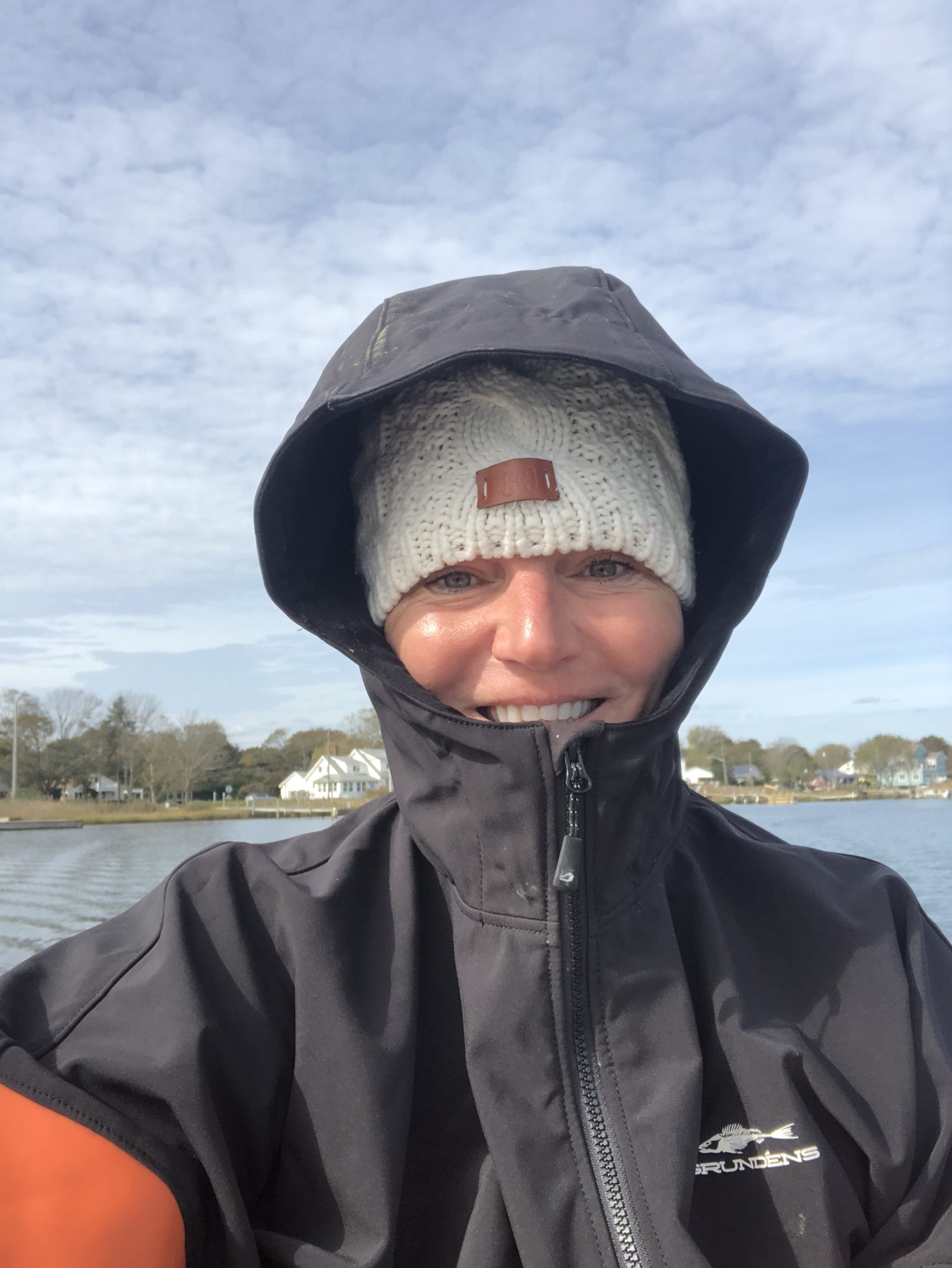“You know what I don’t like?” Sue Wicks asks. “I don’t like the wind.”
The former WNBA star-turned-oyster-farmer has good reason for this animosity: Wind is vicious. It knocks her boat about and thrashes her nets, threatening to send them irretrievably across the Atlantic. She can prepare for the cold with wet suits and heavy gear, but the wind? “You can’t protect yourself from that wind. It really makes for a rough day,” she says.
Speaking to Wicks by phone from the safety of my quarantined and very still apartment, I get the sense that wind is the only thing she doesn’t like about owning and operating Violet Cove Oysters, the aquaculture farm she began in 2017 on Moriches Bay in her native Long Island.
Although the transition to oyster farming might seem like an unusual choice for the former New York Liberty forward and class of 2013 Basketball Hall of Famer, for Wicks, life on the sea was written in her stars. The seeds were planted as a child, traced back to when she’d accompany her father, a commercial fisherman, out on the water. The experience, she recalls, was magical. “I remember just being like, I don’t know, gobsmacked, even when I was a little girl. I was like, ‘Whoa! This is amazing!’ to just be out there,” says Wicks. Her father’s hard work and his own deep respect for the environment that provided his family’s livelihood made a profound impact on her.
But the idea of starting her own oyster farm did take some time for Wicks herself to realize. After retiring from the WNBA in 2002, she served first as assistant coach of women’s basketball at her alma mater, Rutgers, and then associate head coach at St. Francis College in Brooklyn. Then, she founded her own start-up company, Fight 2b Fit, an online fitness platform for kids. Oyster farming might have seemed like a divergent leap from her athletic ventures, but when she told her father about her plans for Violet Cove Oysters, he wasn’t surprised at all. “He was like, ‘It’s in your blood,’” she says.
As for why she chose to work with oysters, Wicks says they seemed the obvious choice for her native Long Island. “I think it’s a heritage thing,” she explains. Oysters, once so plentiful on Long Island, had long ago been destroyed by overharvesting and hurricanes that changed the salinity content. Their re-emergence today, she says, is the result of farming initiatives by commercial ventures like her own and non-profit conservation groups.
Violet Cove Oysters is a sustainable operation that relies entirely on natural resources. A typical day for Wicks begins with an enviable 12-minute boat ride from the dock outside her house onto the inlet where her oysters are housed in floating cages. It takes eight months for an oyster to grow to market size, and so much of her time on the water is spent “splitting” the oysters — i.e. transferring clusters to new nets as they outgrow their old ones. The work is labor-intensive, challenging, and completely exposed to the elements such as the wind, which, she tells me, had reached gusts of 70 miles per hour over the past few days.

The efforts have paid off. In addition to being served in numerous Long Island raw bars, her oysters have made it onto the selective menu at New York’s Le Bernardin. “So that’s like playing Madison Square Garden or Carnegie Hall!” she beams. But when I congratulate her, she knows to whom to bestow the credit. “It’s Mother Nature, really. I’m just tending these oysters, this farm, and letting them grow the way they should grow.”

Although she is passionate about nature, even “a little sensitive these days,” her approach to environmental championing is subtle, embedded deeply in her love and admiration for the natural world, boiled down in parcels to each small, local habitat. Climate change is “not this big, overwhelming thing we can’t stop,” she says. “Most of it is just little habitats that are around us that we can preserve.” In her own farm alone, her oysters have helped clean algae from the water column, allowing in more sunlight for organisms to flourish. Soft-shell crabs seek refuge from predators in the safety of her cages, as do seahorses, which she considers more elusive creatures since she hasn’t seen them in the area since her childhood.
Seahorses aren’t the only reminders of her childhood, though. Now that she’s back on Long Island, she’s coaching the girls’ basketball team at Center Moriches High, where she was a student. I imagine it must be pretty wild for the players to have Sue Wicks for a coach, but Wicks has a more humble assessment. “I’m pretty serious with them, and I think they like being taken seriously,” she says. Wicks rarely plays herself, but “once [in] a while, I’ll shoot and I’ll play, and they’re like, ‘Whoa, she really can play!’”
They still catch her games thanks to social media and virtual platforms — something that surprises her. “One of the girls was like, ‘You were a great player, Coach Wicks!’ and I was like, ‘How do you know, you never saw me play.’ She was like, ‘I can see your games on YouTube. What are you talking about?’ I’m so old school!”
The world her young athletes will inherit is so much different thanks to women like Wicks, who made women’s sports something to be taken seriously. Of the things she’s most proud of as a player, she counts her induction into the Hall of Fame and her time as a sports ambassador for the U.S. State Department, which allowed her to travel the world and forge cross-cultural bonds through a shared love of basketball. She also is proud of her part with the WNBA, from playing with the New York Liberty since the inaugural season in 1997 until her retirement in 2002, to playing in Madison Square Garden, to living a life that always felt like a dream.
Being remembered not just as a basketball player, but as an openly gay athlete, is somewhat more complicated. Although she’s had to work hard at becoming a professional-level basketball player, being gay was just how she was born. “I’m not really that good at being a lesbian, truth be [told],” she jokes. “I’m just stumbling through that!”
But Wicks knows being visibly open is crucial — even today — because it often seems as if we’ve taken steps backward when it comes to acceptance. She recognizes the impact that her own choice of coming out had for those who were struggling to accept their sexuality, who could use her visibility to help them ease into their own. She still recalls times when she’d been approached by fans on the street, eager to share their own intense and powerful memories. “I got to be part of a lot of people’s coming out stories,” she tells me. To hear such personal and emotionally charged revelations from total strangers could sometimes be a little disorienting.
After a beat, she adds, “That doesn’t happen with oyster farming, though.”
Despite her sharp wit and passion for life at sea, Wicks is looking toward uncertain times like the rest of us. With restaurants shuttering for the COVID-19 crisis, demand for oysters has plummeted. “We’re getting smashed right now because we are 100% reliant on restaurants,” she tells me. “So I don’t know what’s going to happen. We don’t know what’s going to happen in the next year or even two years.” Right now, she says, she is in survival mode. But like any good player, she uses the pause to reassess and restrategize for the second half: she’s now expanding her market to reach at-home consumers.
Her favorite part of oyster farming is “being out there on the water every day.” This makes sense, as it seems to embody the essence of the challenge she’s facing. “It’s not just humbling. It’s a feeling of being part of something huge and vast and magnificent and vibrant and changing and different every day.”
Listening to her, it’s no mystery that she was destined to return to her sea-faring roots. From the way she describes sunlight streaming through the water column and the nutrient-rich water that feeds her oysters, it’s maybe more of a wonder that she didn’t come back sooner. Her experience continues to be magical and full of revelations.
“For me, I feel [like] if there is a God, it’s revealed and concealed out there,” she says. “It’s so magical that sometimes I’m just like, ‘Whoa! That is just so beyond that it can only be God speaking.’ And then it disappears and it’s just water again.” An epiphany like the sea, fleeting and magnificent, making sense only for a moment before changing again.


What Do You Think?